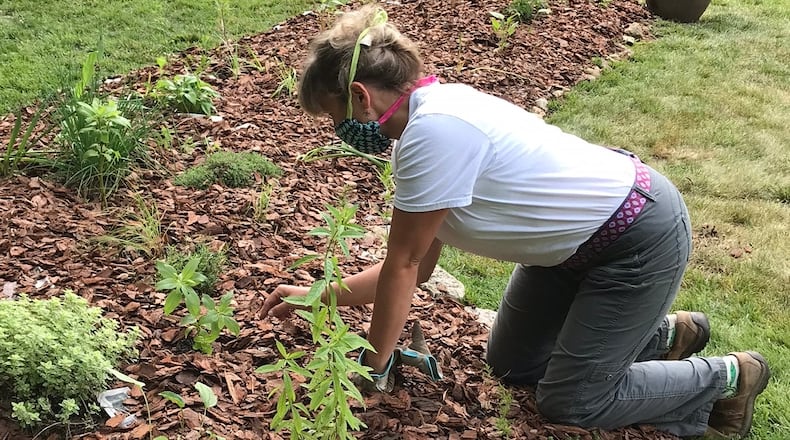“Ever since I was a little girl, I’ve been worried about sustainability and saving the planet,” she said. “When I decided to start a native plant business, I thought, ‘This is exactly what I should be doing to save the planet, because plants are the basis of everything. ... They pull carbon dioxide from the atmosphere; they’re going to cool the climate; they improve the soil.’”
Austin Miller, a southwest Ohio “environmental restorationist” whose company Birdsong Landscapes began in November 2020, said he specializes in installing and maintaining native meadows and prairies, removing ecologically harmful invasive species (such as Amur honeysuckle, Callery pear and Euonymus fortune, or wintercreeper) that crowd out native plants, and managing landscapes for “wildlife value.” He began in the business because of warnings about dramatic bird population declines, the “insect apocalypse” and climate change, which motivated him to act. He was also propelled, he said, by observing the increased challenges many wild creatures face when ecological communities are destroyed by development or other factors.
Molly Kenney said her native plant nursery, Down Nature’s Path, satisfies her love of nature more than a desire for profit. Started in early 2021 on her property in Greenville, the business focuses on plants beneficial to native pollinators, such as solitary bees, butterflies and moths. Kenney pointed out that some butterfly and moth larvae require specific native plant species to survive, so she wants to encourage people all over to plant those species. Large expanses of lawn, she said, are “not doing anybody good” and offer little of value to ecosystems.
Another benefit of native plants, Maynard said, is that they are much easier to maintain than non-native species sold by larger nurseries. “Native plants are locally adapted to our weather patterns and soil types here in Ohio, and they don’t need additional fertilizers. After they’re established—which is usually after the first year—they don’t need supplemental watering.”
According to Miller, native plants also promote erosion control, water filtration and purification, and soil building. Kenney pointed out that when people plant native species and avoid using pesticides, they also attract beneficial insects such as parasitoid flies and wasps, which help keep harmful insects in check.
For those who want to be a part of restoring local ecosystems, Maynard promotes a grassroots, cooperative conservation project called Homegrown National Park, started by author and entomologist Douglas Tallamy. The program encourages people collectively to create “new ecological networks”—to replace invasive plant species and portions of lawn with diverse native species. The goal is to help save endangered species and ecosystems threatened by overdevelopment, pollution, invasive species and global warming.
“HNP is an absolutely inspired idea,” Maynard said. “It is something so easy for people to conceptualize. Just about everyone can envision a giant park. So using that as the framework for starting a native plant movement and getting people to create their own national park in their yards — I love it.”
Because so many of those in the native landscaping business are committed to a common mission, Maynard observed that most don’t see others in the business as competitors. In fact, Birdsong Landscapes, Deeply Rooted Landscapes and Down Nature’s Path will all join Native Ohio Plants of Tipp City for a plant sale at the 2nd Street Market, 600 E. Second St., on Oct. 10 from 11 a.m. to 3 p.m. It’s just in time, Maynard noted, for prime planting season, when cooler temperatures and moist conditions help reduce stress for new transplants.
For people who are just beginning to add natives to their yard, Miller said, they can start small — a few purple coneflowers or orange coneflowers around their mailbox, for example — and gradually add more plants and more species. Or they can let native landscapers do the work for them.
“Some people don’t want to know a lot about plants,” Maynard acknowledged, “but they want to know that they are doing something good for the environment. ... My clients are hiring me because I can create something for them that’s biodiverse and beautiful and will support life in their yard. And that’s why I have a job.”
Kari Carter is a member of The Journalism Lab of Dayton and an instructor at Sinclair Community College.
About the Author

